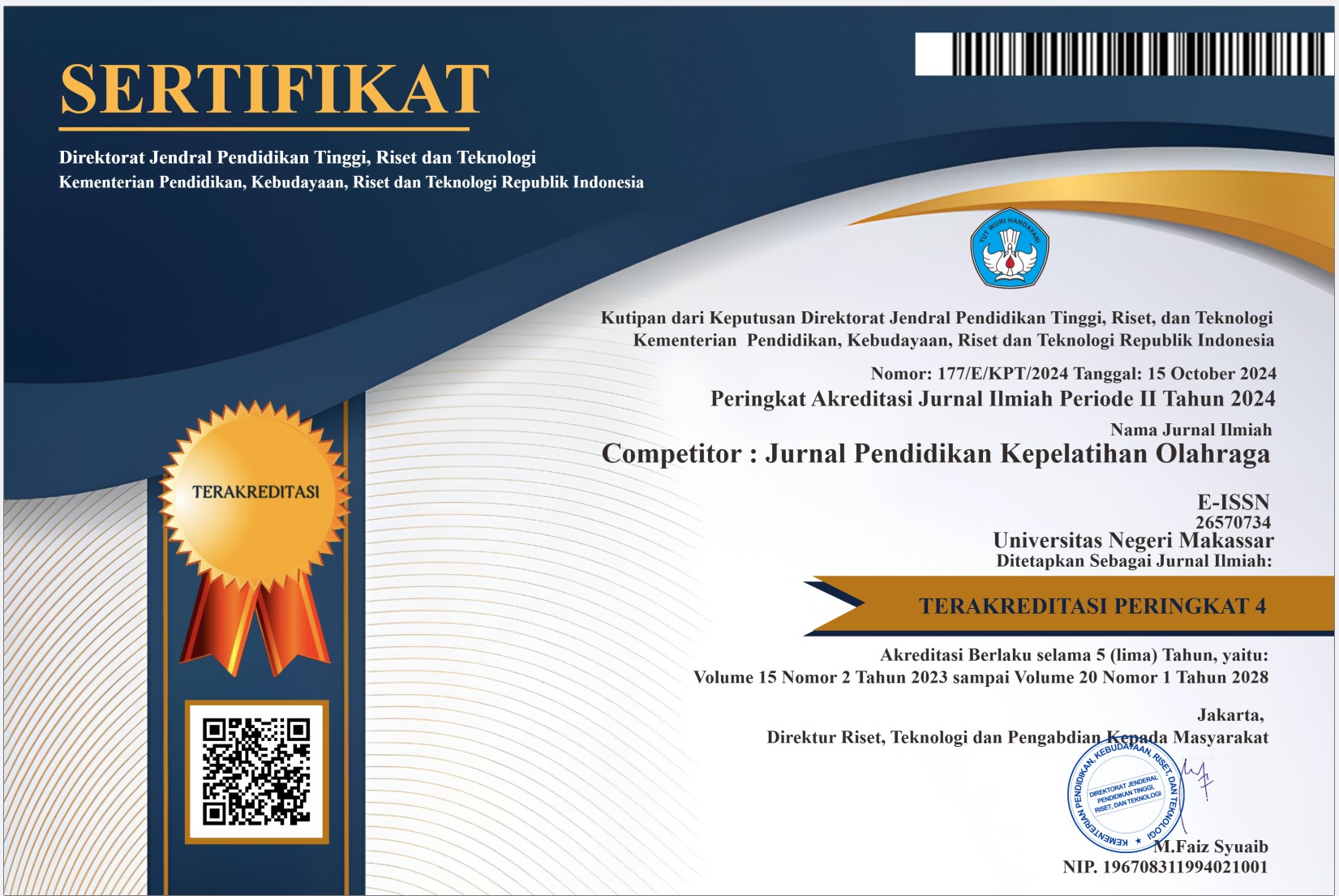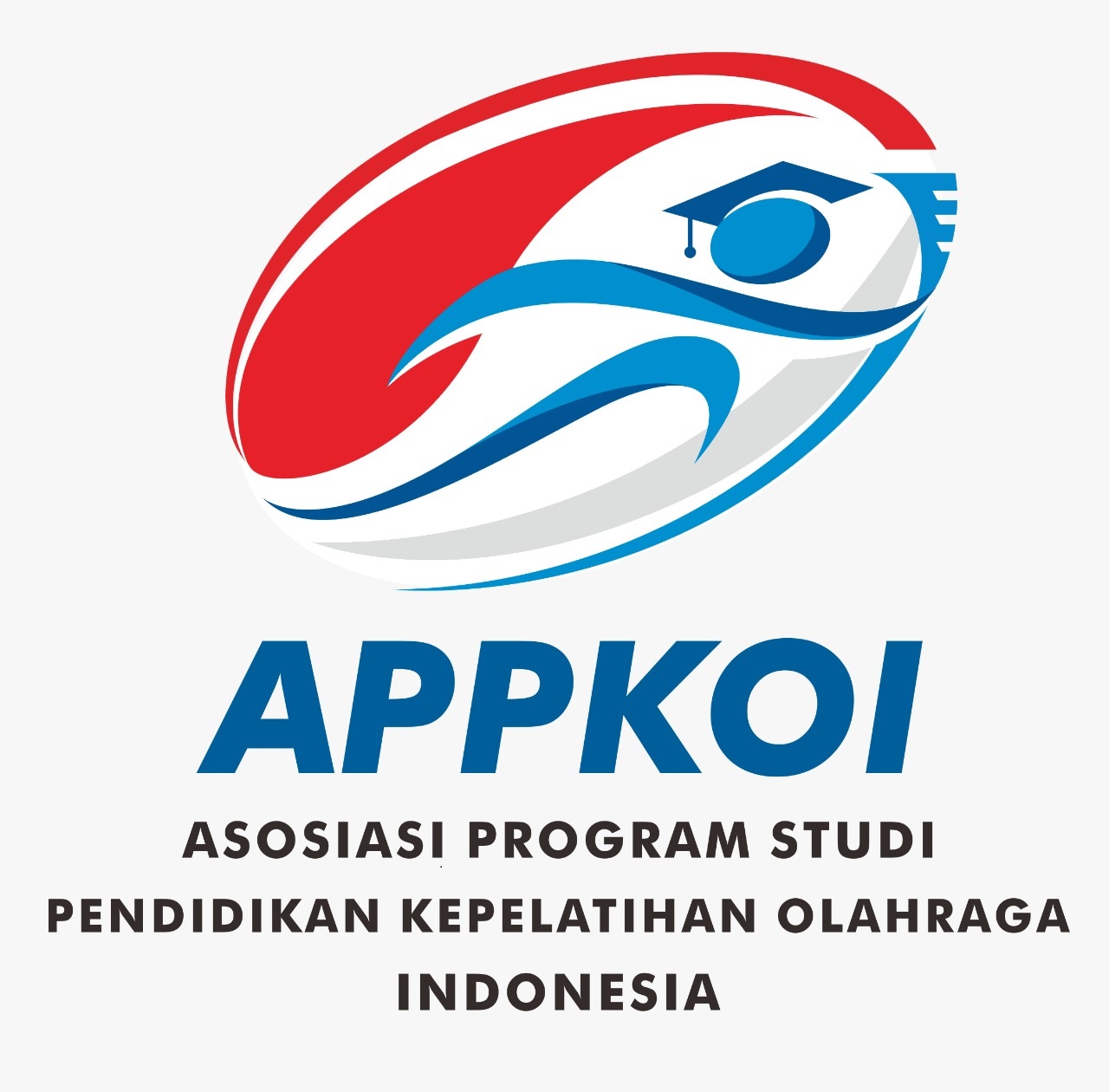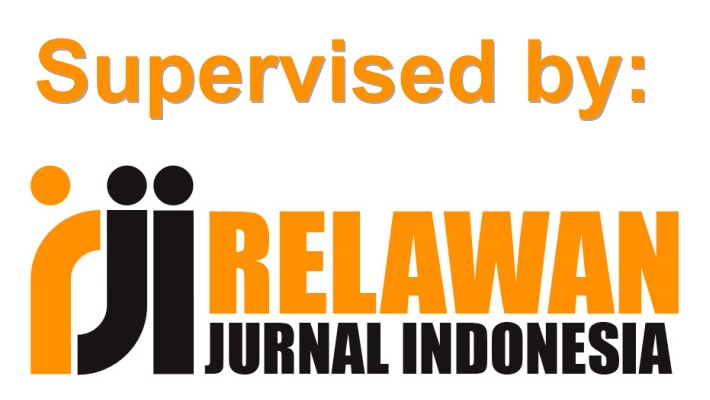Analysis of User Satisfaction with The PSSI Information and Administration System (SIAP PSSI) Account in the 2025 Central Java Soeratin Cup Athlete Data Management System
DOI:
https://doi.org/10.26858/cjpko.v17i3.388Kata Kunci:
User Satisfaction; Sports Information System; Athlete Data; Management; Likert Scala.Abstrak
In the midst of the rapid digitalization era, the presence of sports management information systems has become a crucial and fundamental component in supporting the effectiveness and transparency of modern competition administration. This research is specifically designed to conduct an in-depth investigation and analysis of the satisfaction levels among users of the PSSI Information and Administration System (SIAP PSSI) account. The focus of the evaluation is directed at the system's implementation within the athlete data management framework for the prestigious 2025 Central Java Soeratin Cup. To achieve this objective, the study adopts a systematic quantitative approach, wherein primary data were collected through the distribution of a structured questionnaire survey based on a 5-point Likert scale. The collected data were subsequently analyzed using descriptive statistical methods to identify central tendencies and response dispersion levels. The results of the data analysis reveal a statistically significant and exceptionally high level of user satisfaction. This is substantiated by a mean score centered at 4.52. This convincing level of satisfaction is further reinforced by the finding of a low standard deviation, recorded at 1.02. Such minimal deviation signifies a strong degree of consensus and response homogeneity among all survey participants, implying that the positive perception of the system is uniformly distributed. Consequently, this finding comprehensively implies that the SIAP PSSI system was not only successfully adopted and well-received by its user community but has also proven to be effective and successful in meeting, and arguably exceeding, the crucial expectations related to its functionality, usability, and overall system performance within the measured context.
Referensi
Al-Rahmi, W. M., Yahaya, N., Aldraiweesh, A. A., Alturki, U., & Al-Adwan, A. S. (2022). The impact of perceived usefulness and perceived ease of use on user attitude and intention to use the e-learning system. Information Development, 38(4), 580–594. https://doi.org/10.1177/02666669211020089
An, J., & Lee, S. (2022). A model for measuring the success of information systems in sports federations: A focus on the moderating effect of user characteristics. Journal of Sports Analytics, 8(3), 221-234. https://doi.org/10.3233/JSA-210549
Az-Zahra, H. M., & Hatta, H. R. (2021). Sistem informasi manajemen atlet berbasis web. JIU (Jurnal Ilmiah UHO): Jurnal Penelitian Universitas Halu Oleo, 4(2), 225-232. https://doi.org/10.5281/zenodo.7485304
Cid-Yagüe, L., Martinez-Pascual, B., & Sanmiguel-Rojas, E. (2021). Applying the technology acceptance model to online self-learning: A multigroup analysis. Journal of Innovation & Knowledge, 6(4), 185-194. https://doi.org/10.1016/j.jik.2021.04.002
Feter, N., dos Santos, T. S., Caputo, E. L., & da Silva, M. C. (2021). Evaluating satisfaction and usability of a mobile app for physical activity and sitting behavior change in office workers. BMC Medical Informatics and Decision Making, 21(1), Article 200. https://doi.org/10.1186/s12911-021-01561-1
Filo, K., & Taks, M. (2024). Service quality in sport management. In J. S. Sanderson & P. M. Pedersen (Eds.), A modern guide to sport management (pp. 165–182). Edward Elgar Publishing. https://doi.org/10.4337/9781035301822.00017
Hassan, H., Al-Kofahi, M., & Mohamad, R. (2020). DeLone and McLean's information systems success model in the context of online learning. International Journal of Business Information Systems, 35(2), 173-195. https://doi.org/10.1504/IJBIS.2020.109724
Liao, S., St-Denis, X., St-Onge, C., & Le-May, S. (2023). Evaluating user experience and satisfaction in a concussion rehabilitation app: Usability study. JMIR Formative Research, 7, e45903. https://doi.org/10.2196/45903
Mgasama, Y. O., & Tey, J. Y. (2023). The influence of information quality on user satisfaction in e-learning: A meta-analytic structural equation modelling approach. Education and Information Technologies, 28, 8617–8642. https://doi.org/10.1007/s10639-022-11538-2
Purnama, A., & Hidayat, T. (2022). Rancang bangun sistem informasi pendaftaran atlet olahraga dan official pada Komite Olahraga Nasional Indonesia (KONI) Kota Cimahi. Jurnal Ilmiah Informatika, 10(1), 48-56. https://doi.org/10.33884/jif.v10i1.4746
Quispe-Juli, C. U., Ocsas-Chaupis, B. D., Juli-Poma, L. B., & Casa-Coila, M. D. (2022). Development of a sports training program planning information system (SIPRENPOL). Retos: Nuevas Tendencias en Educación Física, Deporte y Recreación, 46, 1033–1042. https://doi.org/10.47197/retos.v46.93881
Ratten, V. (2023). Digital transformation in the sports industry – a review of the literature. International Journal of Technology and Human Interaction, 19(1), 1-17. https://doi.org/10.4018/IJTHI.327116
Shah, S. M. A., & Ahmad, M. (2023). The role of information technology in sports management. International Journal of Computer Science and Information Technology, 15(2), 27-38. https://doi.org/10.5121/ijcsit.2023.15203
Talukder, S., Sorwar, G., Bao, Y., Ahmed, J. U., & Palash, M. A. S. (2020). An extended UTAUT model to explain the adoption of mobile fitness apps. Heliyon, 6(9), e04968. https://doi.org/10.1016/j.heliyon.2020.e04968
Toma, M. (2023). Digitalization in sports: Innovations and future perspectives. Physical Education and Sport Through the Centuries, 10(2), 143-152. https://doi.org/10.2478/pesd-2023-0017
Wang, R., Li, S., & Li, C. (2023). Sentiment mining of online comments of sports venues: Consumer satisfaction and its influencing factors. Frontiers in Public Health, 11, 1195619. https://doi.org/10.3389/fpubh.2023.1195619
Wang, X., & Wang, Q. (2021). Understanding user satisfaction and continuance intention toward fitness apps: The moderating role of sport type. Computers in Human Behavior, 123, 106886. https://doi.org/10.1016/j.chb.2021.106886
Xu, H., Jia, M., & Li, S. (2024). The impact of social media on university students' revisit intention in sports tourism: A hybrid method based on SEM and ANN. PLOS ONE, 19(3), e0299863. https://doi.org/10.1371/journal.pone.0299863
Yin, L., Peng, N., & Yin, Z. (2020). Satisfaction evaluation model of high-level athletes' management system in universities of Sichuan province of China. Journal of Physics: Conference Series, 1549(4), 042060. https://doi.org/10.1088/1742-6596/1549/4/042060
Zapata, B. C., Fernández-Alemán, J. L., Idri, A., & Toval, A. (2021). Usability evaluation of mobile health applications: A systematic review. Journal of Biomedical Informatics, 114, 103667. https://doi.org/10.1016/j.jbi.2020.103667
Unduhan
Diterbitkan
Terbitan
Bagian
Lisensi
Hak Cipta (c) 2025 Deneira Amalistya, Said Junaidi (Author)

Artikel ini berlisensi Creative Commons Attribution 4.0 International License.



















